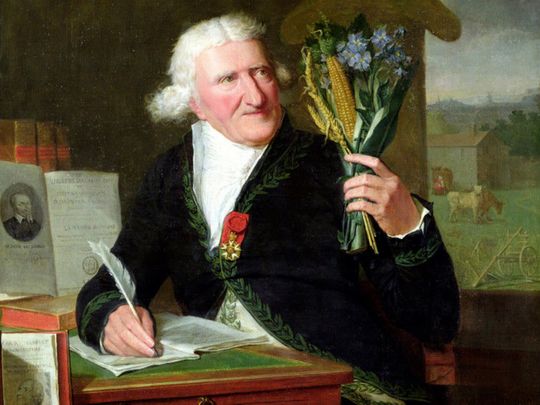
Today, most of the world’s favourite food is made with potatoes – from French fries to mashed potatoes to gratin. But the humble root would have never made it onto our plates if it weren’t for the efforts of an 18th century agronomist.
Click start to play today’s Spell It, where we learn how potatoes got a public relations makeover, and quickly became part of the food people 'cook' every day.
During the Seven Years War in the 1700s, French pharmacist Antoine-Augustin Parmentier found himself as a prisoner of war in Prussia, for three years. His diet in prison comprised mainly of potatoes – something the Prussians cultivated but the French had long viewed with disdain.
In France, at the time, potatoes were considered unfit for human consumption; they were fed to animals. Their resemblance to the stubbed limbs of lepers caused people to believe they were poisonous or caused leprosy, and the fact that potatoes grew underground – not from seeds but from chunks of tubers – also didn’t help its reputation.
Parmentier approached potatoes with this long-held prejudice, but after three years of eating potatoes, he discovered they didn’t have an adverse effect on his health. In fact, the suspicious tubers were actually quite delicious. When he returned to France after three years, Parmentier set out to prove to his countrymen that his experience was no anomaly.
It was the age of the Enlightenment, where experimentation and research were becoming the new norm. Parmentier began by approaching scientific institutions, looking for an official statement from them that would say that potatoes were not dangerous. Famine was a problem in the country in the 1770s, and the Academy of Besancon offered a prize for proposals that would address the problem. Parmentier wrote an elaborate essay extolling the virtues of potatoes, and submitted it to the academy – he won.
Next, he made public efforts to spread awareness about the potato. He held elaborate dinners, wherein the potato featured in different forms in as many as over 20 courses. Parmentier’s eccentric dinners caught everyone’s attention – both former US Presidents Benjamin Franklin and Thomas Jefferson attended them. Years later, Jefferson would have Parmentier’s treatise in his library, and would even include potatoes (which resembled modern-day French fries) in White House dinners.
Parmentier was an expert at PR – he sought celebrities to promote his beloved potatoes. After a meeting with French King Louis XVI and Marie-Antoinette, he convinced them to adorn their outfits with the purple flowers of the potato.
In 1886, he received royal support to cultivate potatoes in a plot of land in Sablon, on the western edge of Paris. Even here, Parmentier approached the situation with theatrics. He hyped up the farm by hiring guards to watch the plot, giving the impression that potatoes were extremely valuable. Then, he asked the guards to retire in the evening, so that curious city folk could steal some tubers and try them out.
Parmentier may seem like a character right out of famed showman P.T. Barnum’s troupe, but his efforts had a profound impact on history. Potatoes began to be farmed in France, and then spread across Europe. Their yields were far more reliable than that of wheat. The tuber thrived, and improved productivity of farms, helping to double Europe’s food supply, in terms of calories, and ending the cycle of famine.
The French king acknowledged Parmentier’s efforts in 1774, granting him a sinecure and allowing him to conduct his own research. He is known to have said: “France will not forget you found food for the poor.” Years later, Parmentier worked with Napoleon’s administration, researching beet sugar and corn. He was awarded the Legion of Honour for his efforts.
France still remembers the splashy entrepreneur, and many dishes made with potatoes are named after him. Hachis Parmentier, for instance, is a kind of shepherd’s pie made of ground beef and mashed potatoes. A statue of Parmentier stands in Somme, France, and a metro station in Paris is named after him. His grave in Pere Lachaise Cemetery in Paris, is surrounded by potato plants, a tribute to the man who worked so hard to bring the tuber to dining tables everywhere.
What do you think of Parmentier? Play today’s Spell It and let us know at games@gulfnews.com.








